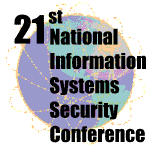
|
| Workshops Program |
|
| Thursday, October
8, 1998 |
1:30 - 6:00 p.m.
8:00 a.m. Registration
Pre-registration required - Cost: $120
Attendence limited
Regency Ballroom Foyer
Add to your conference experience by attending one of these
outstanding technical workshops. |
|
| Workshop 1 |
|
Securing Your Place On The Web
- Ken Cutler, MIS Training Institute/Information Security
Institute
The World Wide Web (WWW) technology has been a major contributor
to the exciting growth of the Internet. With the opportunity to
globalize electronic commerce across the Web, in addition to
having easy access to an attractive new vehicle for developing
their own web of intranets for internal applications, many
organizations are rushing to jump on the Web technology bandwagon.
As with any new technology, the vast array of Web browsers,
servers, and security protocols are still in their infancy which
translates to many potential security pitfalls. In this
up-to-the-minute workshop, we will:
- Highlight the security and audit implications of important
components of TCP/IP, Internet & Web technology
- Identify the key security control points and related threats
to your external and internal Internet/Web environment
- Pinpoint serious security issues and important security
countermeasures associated with Web application development
software tools including: Java, ActiveX, JavaScript, CGI, SSI, "cookies,"
and robots
- Build a shopping list for security features for selecting and
configuring secure Web server (HTTP) software
- Make sense of the myriad of new Web security protocols such
as SET, SSL, S-HTTP, PCT, STLP, S-WAN, PPTP, IPsec, L2TP
- Develop an end-to-end security plan by relating major
Internet/Web security threats to a checklist of practical
safeguards including: host security, firewalls, user
authentication, and cryptography
- Provide tips in selecting tools and techniques to organize an
effective, on-going audit plan for evaluating the security of
your Internet/Web environment.
Note: In addition to the session notes, participants in the
workshop will receive a copy of the famous ISI Swiss Army Knife
Security & Audit Reference, a glossary of distributed
information systems terminology, and a Web Security and Audit
Survival Kit. |
|
| Workshop 2 |
|
Common Criteria Protection Profile
- Lynne Ambuel, BDM International
- Murray Donaldson, CESG, UK
This workshop will provide information and instruction on using
the Common Criteria to build protection profiles to express
information technology security requirements. Community experience
in building protection profiles will be used for this instruction.
Alternative sets of related technologies will be compared and
contrasted in the hope of harmonizing like requirements into
generic protection profiles for given technologies (i.e.
firewalls). In addition, issues arising from attempting to create
protection profiles representing non-classic requirement sets will
be discussed. |
|
| Workshop 3 |
|
How to Establish an Incident Handling Capability
- Sandy Sparks, CIAC-Lawrence Livermore
- Marianne Swanson, NIST
This workshop, which is sponsored by the Federal Computer
Incident Response Capability (FedCIRC), will address many of the
technical and administrative issues involved in establishing an
incident handling capability. Topics to be covered include
organizational structure, roles and responsibilities, technology
platforms, incident handling methods, sample policy, reporting and
issuing alerts, administrative and incident handling procedures,
communications (users, other) and lessons learned. |
|
| Workshop 4 |
|
Connecting to the Internet
- Tom Christian, CIAC - Lawrence Livermore National Laboratory
This workshop will address many of the technical issues involved
in connecting to and managing systems and sites that are part of
the Internet. Current threats on the Internet and how to work with
incident response teams and obtain sources for more information
will be explored. Administrative information such as the
importance of setting up policies with management support will
also be given. Topics to be covered include Internet threats,
securing the system, detecting intrusions and security on the
Internet. |
Last update September 11, 1998 |

